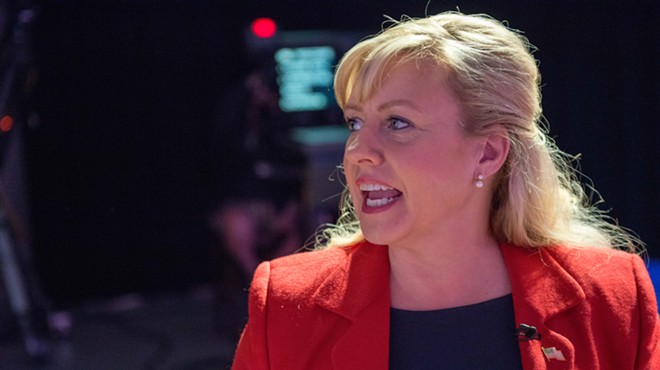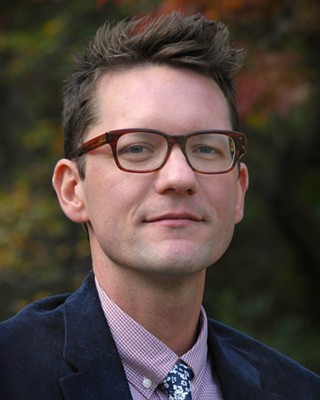After a $40-a-plate breakfast fundraiser last Thursday, Spokane Mayor Mary Verner went to City Hall, where she unveiled an electric vehicle charging station. It was Earth Day. Her supporters glowed.
It was no coincidence that Verner launched her re-election campaign on Earth Day. Nods to environmentalism have been a hallmark of Verner’s mayoralty. From the beginning, she promised to make the city more sustainable and to position it as a hub in the burgeoning green economy. As she likes to remind us, she’s our “green mayor.”
In the last two-plus years, Verner has made changes big and small at the city, pushing it toward sustainability and efficiency. She directed city fleet drivers to shut down their engines instead of allowing them to idle. She declared Nov. 3, 2008, the “first day in the reusable bag era” when the “CHOOSEreusable” program was launched in Spokane. Last month, she encouraged citizens to participate in the feel-good Earth Hour.
But perhaps her biggest feat to date was the passage last May of her Sustainability Action Plan. It has also caused the biggest backlash.
“The U.N., through ICLEI, is usurping power at the city,” says Mike Fagan, referring to the International Council for Local Environmental Initiatives. This Monday, the Spokane City Council will consider two initiatives put forth by Fagan aimed at revoking the city’s membership in ICLEI and “preventing the city of Spokane from implementing aspects of the Mayor’s Sustainability Task Force.”
Fagan is a founding member of the Spokane Patriots, “the action-driven Tea Party,” which is behind the initiatives. Fagan also unsuccessfully ran for City Council last year.
As he sees it, the mayor’s action plan is part of a vast conspiracy that could lead to one global government. Fagan isn’t clear on how exactly Spokane would fall under the aegis of the United Nations. But his fear echoes many of the points listed on the Website for the group Freedom Advocates, which says ICLEI will “ultimately eliminate your freedoms and destroy your way of life” in its recognition of human-caused climate change and the subsequent “managed control of your life.”
“We’re not part of the United Nations. I’ve heard Democrats and Republicans say there is global warming,” says Joe Shogan, the council’s president. “Do I agree with [Fagan]? No. Do I believe in the initiative process? Yes.”
If the council approves the initiatives’ titles and language, which is very likely, Fagan’s group will need to collect about 8,300 signatures by July 6 to get them on November’s ballot.
Councilwoman Amber Waldref, who defeated Fagan last November, is unsure he can collect that many signatures.
“I see this as a minority viewpoint,” Waldref says, adding she’ll do all she can to educate people about the sustainability plan. “Reasonable citizens of Spokane will see this as an unproductive effort.”
Lloyd Brewer, the city’s environmental programs manager, sounds a bit tired of explaining why Spokane isn’t being taken over by the U.N.“ICLEI is an international organization that is focused on trying to help communities address climate change,” he says, mentioning that even though ICLEI was conceived at a meeting of U.N. nations, it’s not a U.N. organization. “One of the first things you do is you document what your emissions are and then you try to reduce them.”
Last year, the city paid $2,250 in membership fees to the organization. “That gives us the access to some of their software products, which helps in the calculation of the greenhouse gas emission,” Brewer says. It’s a relationship similar to others the city has with organizations such as the Association of Washington Cities and the National League of Cities. “They also have information about other places and what they’ve done to reduce [emissions].”
When asked if the Sustainability Action Plan has cost the city any money, Brewer says it depends on your perspective.
For instance, the city’s water stewardship program can be considered part of the sustainability plan. And it costs the city $650,000 every year. A lot of that is covering rebates for citizens upgrading their washing machines, toilets and sprinkler systems to high-efficiency models. The money to pay for all this comes from utility ratepayers.
However, the program was established three years before the sustainability plan was even adopted and one year before Verner was mayor.
Regardless of how the numbers are crunched, Marlene Feist, the mayor’s spokeswoman, says the city’s efforts at sustainability have generated savings.
Renovations at City Hall, including retrofitting the building’s HVAC system, have saved the city $75,000 annually and led to Avista handing over a check for $275,000. Using recycled glass in the new Market Street roadbed saved about $67,000. Over the last few years, the city has been slowly replacing its traffic lights with LED replacements, for about $57,000 in yearly savings.
“We did the greens first, then the reds, then the yellows last, because they’re not on as much,” Feist says.
But not every effort at sustainability saves, she says, pointing to the city’s use of re-refined oil for its 1,400-vehicle fleet. The extra 25 cents per gallon will result in an extra $2,300 spent by the city every year.
It’s not that much, but Fagan takes exception with even this.
“The city’s using recycled motor oil. She recommended the citizens do the same,” he says of Verner. “I called a couple of big oil-change places. They said, heck no, they would never [use recycled oil]. It would void the warranty on the car.”
But according to a recent article in Scientific American, re-refined oil is safe. About 10 percent of the 1.3 billion gallons of oil used in the country annually is recycled and re-used as motor oil.
It’s this point-by-point
battle that Fagan is ready to mount against the mayor. How big of a
response he receives from Verner will help define the intensity of her
battle to remain the city’s “green mayor.”


























